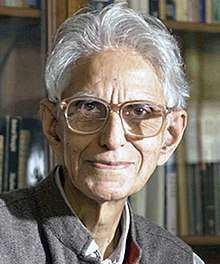Obaid Siddiqi
Obaid Siddiqi FRS (7 January 1932 – 26 July 2013) was an Indian National Research Professor and the Founder-Director of the Tata Institute of Fundamental Research (TIFR) National Center for Biological Sciences. He made seminal contributions to the field of behavioural neurogenetics using the genetics and neurobiology of Drosophila.
Obaid Siddiqi | |
|---|---|
 | |
| Born | 7 January 1932 Basti, Uttar Pradesh |
| Died | 26 July 2013 (aged 81) |
| Citizenship | Indian |
| Alma mater | |
| Awards | Padma Bhushan (1984)
Padma Vibhushan (2006) FRS (1984) |
| Scientific career | |
| Fields | Biology |
| Doctoral advisor | Guido Pontecorvo |
| Notable students | Veronica Rodrigues |
Early life and education
Obaid Siddiqi was born in 1932 in Basti district of Uttar Pradesh. He received his early education at Aligarh Muslim University where he completed his M.Sc. He completed his Ph.D. at the University of Glasgow, under the supervision of Guido Pontecorvo. He carried out his post doctoral research at the Cold Spring Harbor Laboratory, University of Pennsylvania, and the MRC Laboratory at Cambridge. He was invited by Homi Bhabha to set up the molecular biology unit at the Tata Institute of Fundamental Research (TIFR) in Bombay in 1962. Thirty years later, he became the founding director of the TIFR National Center for Biological Sciences in Bangalore, where he would continue his research into his final days of life.[1]
Research
Siddiqi's studies in the field of neurogenetics unravelled the link between genes, behaviour and the brain. In the 1970s, his work with Seymour Benzer[2] at Caltech led to the discovery of temperature-sensitive paralytic Drosophila mutants and the generation and transmission of neural signals.[3] This heralded the dawn of the field of neurogenetics.
At TIFR, Siddiqi and his graduate student, Veronica Rodrigues,[4] isolated and characterized the first collection of mutants with defects in smell and taste in Drosophila. Siddiqi's work in neurogenetics led to the foundational advances in understanding how taste and smell are detected and encoded in the brain.[5]
Awards and honours
- President of the Indian Academy of Sciences
- Member, Royal Society, London
- Member, US National Academy of Sciences, Washington
- Member, Third World Academy, Trieste
- Visiting professorships at Yale University
- Visiting Professor, Massachusetts Institute of Technology
- Visiting Professor, The California Institute of Technology
- Visiting Professor, Cambridge University
- Twice Sherman Fairchild Distinguished Scholar at Caltech
- Sir Syed Ahmad Khan International Award for Life Sciences 2009
- Padma Vibhushan, 2006[6]
- Dr. B. C. Roy Award, 2004
- Sir Syed Life Time Achievement Award, AMUAA New York, 2004
- Pride of India Award, AFMI, USA, 2004
- INSA Aryabhata Medal 1992;
- Goyal Prize 1991;
- Birla Smarak Kosh National Award 1989;
- Padma Bhushan 1984;[7]
- Bhatnagar Award 1976;
- Life member of Clare Hall, Cambridge.
- Honorary D.Sc., Aligarh Muslim University, Aligarh
- Honorary D.Sc., Banaras Hindu University, Benaras
- Honorary D.Sc., Jamia Hamdard, Delhi
- Honorary D.Sc., Kalyani University, Kalyani
- Honorary D.Sc., Indian Institute of Technology, Bombay
- Honorary D.Sc., Jamia Milia, Delhi
- Honorary D.Sc., Central University of Hyderabad
Legacy
Siddiqi died on 26 July 2013 in Bangalore following a freak road accident on 21 July 2013 which caused severe damage to the brain. He is survived by his wife Asiya, sons Imran and Kaleem, and daughters Yumna and Diba.[8]
Selected publications
|
|
References
- "Prof. Obaid Siddiqi". Archived from the original on 11 October 2017. Retrieved 7 June 2012.
- Tanouye, Mark A. (February 2008). "Seymour Benzer 1921–2007". Nature Genetics. 40 (2): 121. doi:10.1038/ng0208-121. PMC 2655269. PMID 18227864.
- "Obaid Siddiqi | the Best of Indian Science".
- "Veronica Rodrigues 1953-2010 | NCBS news".
- https://vigyanprasar.gov.in/wp-content/uploads/DreamOctober2013Eng.pdf
- "Indian Fellow". Archived from the original on 13 August 2016. Retrieved 7 June 2012.
- "Padma Awards" (PDF). Ministry of Home Affairs, Government of India. 2015. Archived from the original (PDF) on 15 November 2014. Retrieved 21 July 2015.
- "Acclaimed scientist Obaid Siddiqi no more". The Hindu. Bangalore. 27 July 2013. Retrieved 14 December 2017.